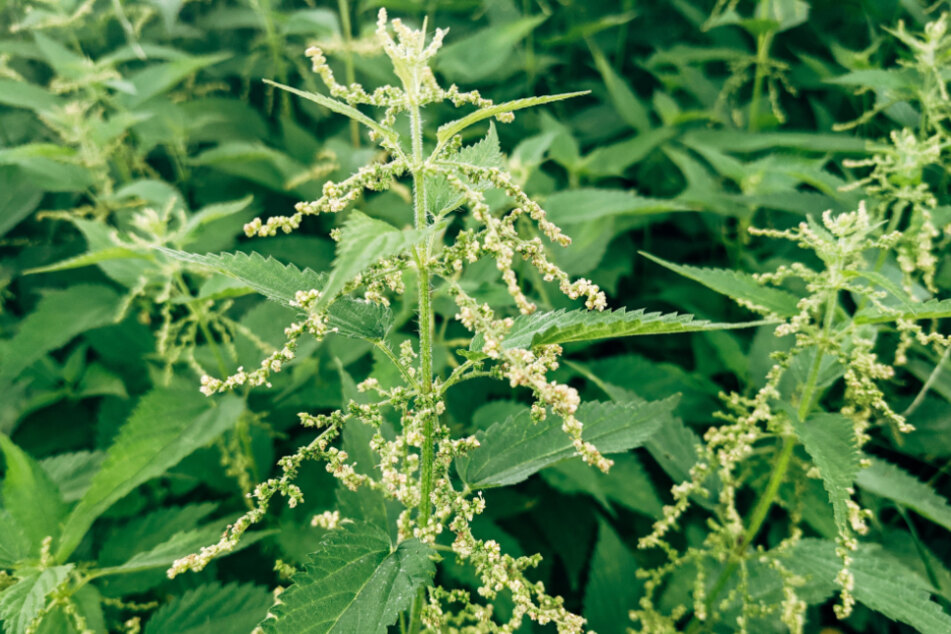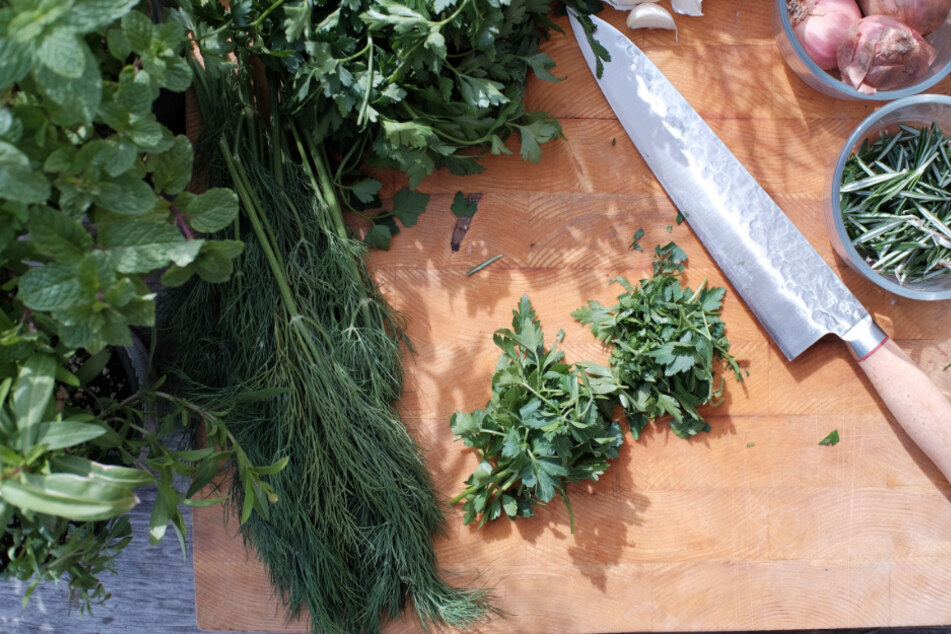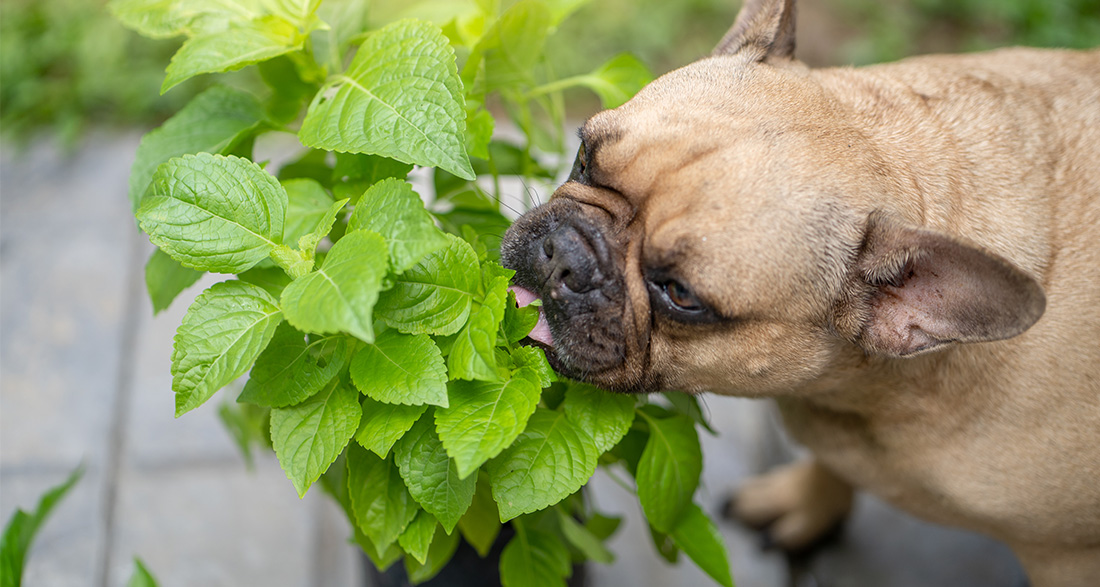Healing for your dog from the meadow and the herb garden: Herbs for dogs can be a meaningful addition to dog food.
Nature has much to offer. There are numerous herbs and plants that support your dog’s health.
The beauty of herbal medicine is that it is simple and gentle to apply. Medicinal herbs naturally support your dog.
Natural medicine is not a fundamental substitute for veterinary examination, but it can strengthen the dog additionally.
If you want to feed your dog with herbs, it is best to seek advice beforehand, as there is much to consider. Also, not all herbs are suitable for every dog; for example, pregnant bitches should not be given herbs as they could, in the worst case, trigger premature birth.
The dog guide explains which herbs are suitable for dogs and their effects on the health of your four-legged friend.
Why should I give herbs to my dog?
Dogs are omnivores and need a healthy, balanced, and varied diet. Some dog owners give their four-legged friends ready-made commercial food. Others prefer feeding them raw meat, also known as BARFing (Biologically Appropriate Raw Feeding).
It doesn’t matter how the dog is fed; dog owners should always ensure that their pet receives sufficient nutrients. Commercially produced or low-quality food is often relatively vitamin- and enzyme-poor. On the other hand, balancing calcium and phosphorus in BARF diets can be challenging. In many cases, natural herbs can help the dog in these situations.
Herbs and medicinal plants serve dogs as dietary supplements, prophylaxis, and therapeutic agents.
Herbs and plants contain nutrients such as minerals, trace elements, vitamins, fibers, digestive enzymes, and amino acids. They are also rich in secondary plant substances such as flavonoids, chlorophyll, carotenoids, tannins, and bitter substances.
The nutrients and secondary plant substances are essential for the dog’s organs, such as the skin, liver, kidneys, stomach, intestines, and support bodily functions such as digestion, cell protection, metabolism, and immune defense.
Herbal remedies for dogs are also used to alleviate pain and treat allergies, inflammations, and various symptoms. The plants help with minor complaints or minor injuries, such as small superficial scratches.
However, it is generally important for dogs with health problems to undergo veterinary examinations. If dog owners want to support their pet’s health by feeding them herbs, they should seek specialized advice on suitable plants and the appropriate dosage for the dog.

Which herbs and plants are good for dogs?
Basil Due to its antibacterial properties, basil is suitable for external use in insect bites and skin problems. Since basil is also rich in vitamins and minerals, consumption is good for coughs and bronchial issues in dogs.
Mugwort
The bitter herb promotes salivation in dogs, positively influencing stomach activity and digestion. Mugwort also stimulates the liver, gallbladder, and pancreas.
Birch
Birch leaves help dogs with joint inflammation and rheumatism. The nutrients it contains are also good for the bladder, urinary tract, and kidneys of the four-legged friend.
Summer Savory
Summer savory helps dogs with diarrhea and stomach cramps. If harvested shortly before flowering and fed to the dog, the herb can unfold its digestive and stomach-strengthening effects.
Nettles
Nettles are very beneficial for the health of dogs. The plants have anti-inflammatory and detoxifying effects, making them suitable for problems with the kidneys, urinary tract, and bladder. The plants are also good for the blood, as they oxygenate and are rich in iron. The leaves should be offered to the dog well crushed or pureed, as they can otherwise cause pain.

Dill
Dill is not only tasty for dogs but also a digestive mineral source. In bitches, dill can promote milk production but should always be administered with caution.
Tarragon
If dogs eat tarragon, it stimulates their appetite. However, the plant is also antispasmodic, digestive, and stomach-strengthening.
Fennel
Fennel is very vitamin- and nutrient-rich. For dogs, fennel is a healthy addition that they can consume raw or cooked. Fennel seeds can also be mixed into the food, stimulating the dog’s digestion. Fennel tea can help dogs with bloating or loosen mucus in the airways for coughs and bronchial problems.
Daisies
While playing in the meadow, dogs sometimes eat daisies. These are appetite-stimulating and help with stomach problems but can also have a laxative effect.
Ground Elder
If the dog has problems with the intestines or bladder, ground elder can help because this plant has a diuretic, dehydrating, and deacidifying effect. However, only the very young, fresh, and light green leaves should be fed.
Ground Ivy
Ground ivy helps dogs with gum inflammation and other skin problems.
Rose Hip
The shell of the rose hip is full of vitamin C, which contributes to building the immune system and protecting against diseases in dogs. The carotenoids contained in rose hips have anti-inflammatory and pain-relieving effects, which can help dogs with joint problems such as arthritis, osteoarthritis, and rheumatism.
St. John’s Wort
St. John’s wort and especially the red oil obtained from its flowers are particularly good for the nervous system. It has a calming and relaxing effect on dogs.
Chamomile
Chamomile alleviates inflammations, helping dogs relax and calm down. The plant can also help dogs with joint problems.
Chervil
The healing effect of chervil on dogs is very extensive. The medicinal plant acts as a blood purifier, diuretic, metabolism stimulant, expectorant, and diaphoretic. Chervil detoxifies the liver and kidneys and helps dogs with fever or eczema.
Lovage
Even small amounts of lovage are beneficial for a dog’s digestion and relieve stomach cramps. The medicinal plant is also dehydrating, which can help the dog’s kidneys.

Dandelion
Dandelion leaves cleanse and detoxify the dog’s body, helping with conditions such as rheumatism and arthritis. The plant is also very rich in bitter substances, making it useful in kidney or liver treatments for dogs, especially during shedding.
Marjoram
As marjoram has expectorant properties, this herb helps dogs with coughs and bronchial issues. Marjoram is also beneficial for the dog’s digestion, supporting the natural function of the stomach and intestines, which counteracts issues like bloating.
Milk Thistle Herb
If a dog suffers from liver disease or metabolic issues, milk thistle herb can be beneficial. The plant detoxifies the liver and gallbladder, making it recommended for dogs with skin problems, overweight issues, or older animals.
Melissa (Lemon Balm)
The vitamin-rich and mineral-containing lemon balm alleviates nervously induced issues in dogs, such as sleep disturbances. External application of lemon balm tea helps dogs with insect bites.
Mint
Mint is not only helpful when dogs have bad breath. Its strong antiseptic effect makes mint a good natural remedy for various gastrointestinal problems, such as stomach pain, bloating, and diarrhea.
Oregano
Oregano supports dogs with coughs and bronchial issues. The medicinal plant can also be used against parasites and fungal infections. As oregano contains bitter substances, it has a soothing effect on the stomach and intestinal flora, making it helpful for dogs with bloating and diarrhea.
Parsley
Parsley is a significant source of vitamin C for dogs. The herb is also highly diuretic and aids in bladder problems. If the female dog is pregnant, dog owners should avoid parsley as it can induce premature labor and affect milk flow.
Burnet (Small Burnet)
The natural healing plant is used in dogs against kidney and bladder stones, as it supports the liver and kidneys in their function. Furthermore, burnet is blood-purifying, appetite-stimulating, and digestion-promoting.

Rosemary
Older dogs, in particular, benefit from rosemary, as this plant has a stimulating effect and helps with weakness and exhaustion. Rosemary also alleviates rheumatic complaints. Additionally, rosemary increases gastric juice production and promotes digestion, stimulating the appetite in dogs.
Sage
Besides benefiting humans, dogs with a cold can also benefit from sage. The medicinal plant has antibacterial properties and alleviates inflammation of the mucous membranes. Sage can also be used in dogs with diabetes, bloating, and anxiety.
Yarrow
Yarrow helps the liver, digestion, and the hormonal system of dogs. The medicinal plant also has a blood-stopping or clotting effect, making it suitable for mixing into the food of female dogs during heat.
Plantain
The juice of plantain is the first aid for insect bites, as the secretion is antibacterial, hemostatic, and anti-inflammatory. The plant is also suitable for internal treatment in dogs, as it loosens mucus, clears the airways, and supports the bronchi.
Thyme
Thyme protects dogs from colds, as the plant supports the respiratory system. The herb also helps with parasites in the intestines by promoting expectoration in dogs.
Hawthorn
Consuming the fruits or leaves of hawthorn is good for the heart and circulation of the dog, making it popular for use in older dogs. The medicinal plant promotes blood circulation and regulates blood pressure. Dogs also become more relaxed through hawthorn.
Hyssop (Hyssopus officinalis)
The function of the liver and kidneys is supported in dogs by the application of hyssop. Since the medicinal plant is also a potent muscle relaxant, it is particularly suitable for dogs with epilepsy.
The list of beneficial medicinal herbs for dogs is much longer. Those looking for suitable herbs for their own dog can get information from a veterinary practice or a dog nutrition consultation.

Dosage and Administration of Herbs for Dogs
When feeding herbs to dogs, less is more.
Too many herbs usually have the opposite effect, causing digestive problems in dogs, including diarrhea and vomiting. The mixture is also crucial because many herbs only unfold their full effect in combination with others.
To find the ideal herb blend for your own dog, it is advisable to have the dog examined and follow the recommendations that result from it.
Both fresh and dried or frozen herbs are suitable for feeding. It is essential to ensure good quality, and the plants should be free of any pollutants.
To make fresh herbs more palatable for dogs, the medicinal plants can be finely chopped and mixed into the food. A decoction can be made from dried or frozen herbs with hot water, which can also be mixed into the dog’s food.
Caution
Those who use ready-made food for their dogs should pay attention to which herbs and nutrients are already included.
There are also special preparations for dogs recommended by veterinarians, and advice on these is available in some pharmacies. It is essential to strictly follow the dosage recommendations for these products. Manufacturers are also obligated to indicate whether the product is a medicinal or dietary supplement for dogs.
When deciding whether to administer fresh herbs or specific preparations to the dog, it depends on the purpose. Those who only want to enrich their dog’s diet can resort to natural and fresh herbs.
For therapy or treatment with herbs, preparations are more suitable as they guarantee that the dog is always given exactly the same dosage of active ingredients. With a plant, it’s never precisely known how much active substance it contains.
In any case, it is recommended to seek advice on the correct dosage and application of herbs for the dog beforehand.
Collecting Herbs for Dogs Yourself
For those who do not want to buy herbs, they can collect them during a walk with the dog.
If collecting herbs for dogs yourself, the following points should be considered:
- Only those who are knowledgeable and absolutely certain that it is the right plant for the dog should collect herbs.
- Herbs should only be harvested in the required quantity so that the natural ecosystem is not restricted.
- In nature reserves, herbs should not be collected.
- Herbs should not be collected along highways, on dog walking areas, and at field edges, as they are likely to be contaminated with pollutants, dog urine, fertilizers, and insecticides.
- Only clean, fresh, and healthy herbal plants should be collected.
- Most herbs can be collected from April to October.
Tip
Dog owners can also plant herbs for their dogs in their garden, inside the house, or on the balcony.
Herbs for dogs support the health of the animal but should be carefully dosed according to the individual dog and preferably administered after consultation with the veterinary practice.


